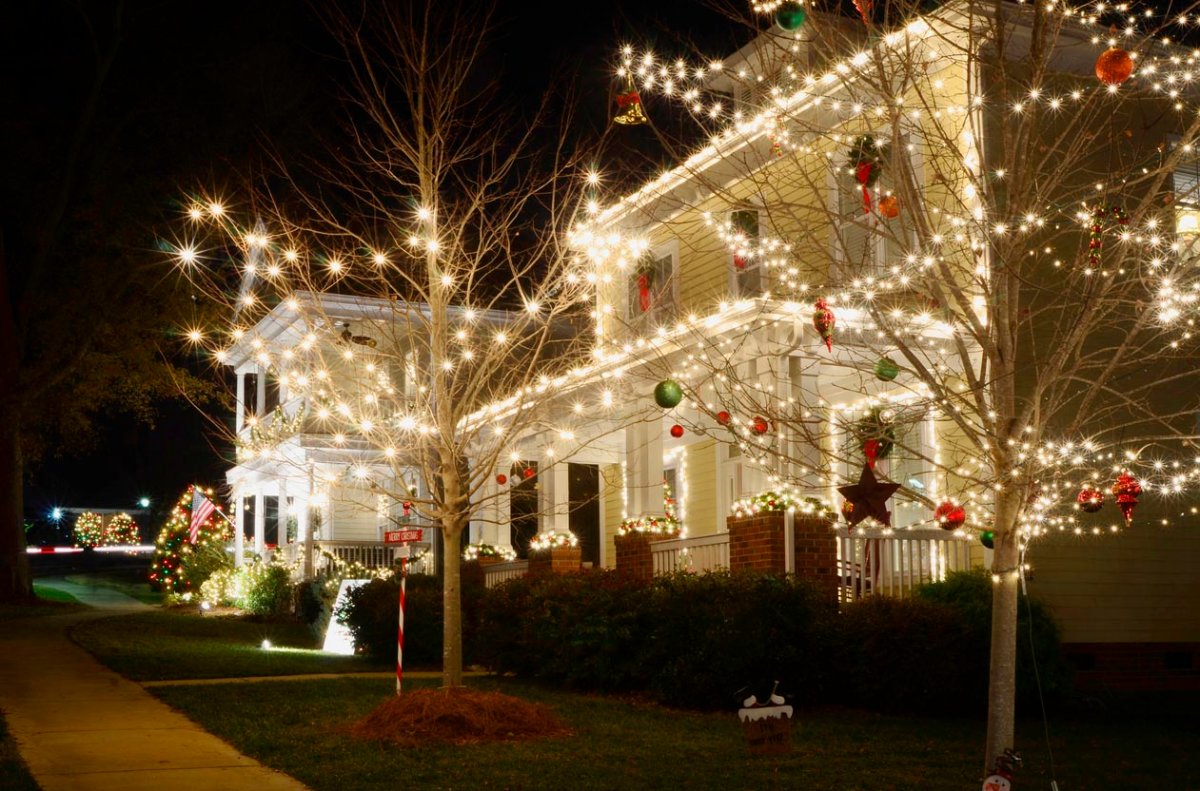

We may earn revenue from the products available on this page and participate in affiliate programs. Learn More ›
Q: Last year there were a lot of break-ins and thefts in my neighborhood around the holidays, and before this year’s season begins, I am looking for some holiday safety advice. What can I do to protect my home and family during the festive season?
A: You’re right: while the holiday season is often a time to spend with friends and family celebrating cultural and religious occasions and the start of a new year, it’s also a time when many people are distracted and busy, and often traveling, and therefore not paying as much attention to home security as usual. It’s also a time when people on the lookout for easy targets and quick thefts have many more opportunities than usual, as more people are out shopping and leaving obvious indications that they’ve been buying gifts. In addition, many homes are bedecked with lights, trees, and other decorations; homes are lit with candles; and people are cooking traditional meals. There’s a lot going on, and it’s easy to forget basic holiday safety tips.
To avoid having a holiday ruined by theft or an accident, it’s ideal to consider addressing some holiday safety topics before the season is in full swing. Budgeting for security camera installation costs, paying attention when traveling and shopping, and making fire and electrical safety a priority will keep your holiday warm and festive and your family secure.
Avoid announcing your travel plans online.

Many people travel during the holiday season. Sharing photos and fun moments on social media is a great way for someone to include family members and friends in their adventure—but if the privacy settings on social media posts aren’t locked down, those posts are advertising to anyone who sees them that the house is empty. This isn’t to say that there needs to be a complete lockdown on posts while traveling, but users will want to think hard about who can see the posts and reconsider the privacy settings on the accounts. Oversharing is one of the biggest holiday mistakes that can invite burglars to a home.
Although it may be fine for close friends and family to see highlights of the trip, it’s often best to use a group text or private chat rather than placing that information on social media that can be hacked. This is an important workplace holiday safety tip as well: Colleagues will likely know who is traveling over the holiday, but setting the “out of office” message to “See you in the new year—relaxing on a beach in Florida until then!” broadcasts plans and places the home at risk.
While traveling, it’s also important for individuals to consider basic strategies such as ensuring that luggage isn’t labeled with the name, address, and phone number of the owner on an open tag that any passerby can see: Such tags are like advertisements of an empty house. Taking care to secure luggage and gifts out of sight if they’re stored in a car at the destination can prevent thieves from breaking into a car. The National Safety Council (NSC) offers several helpful holiday driving safety tips, such as preparing ahead of time for car problems, travel delays, and other unforeseen challenges by performing scheduled maintenance, packing an extra change of clothes, and bringing cell phone charging banks along will make for a safer and smoother trip.
Ask your neighbors to keep an eye on your house while you’re away.
There’s no need for someone to broadcast their travel plans to the whole neighborhood, but letting a couple of trusted neighbors know the house will be empty is a great holiday travel safety tip. According to National Neighborhood Watch, a division of the National Sheriffs’ Association, neighbors can keep an eye on the house, pick up any stray packages that arrive later than expected, and grab the newspaper if the hold placed on the delivery is accidentally overlooked.
If the neighbors are having overnight guests, they can park in the driveway of the empty house so that cars will come and go, making the home look more lived-in. If the house doesn’t have smart locks, it’s also handy for the residents to have a neighbor they can call and ask to check the front door to make sure they locked it before leaving.
If you shop online, make sure the vendor is established and reputable.
Many people prefer doing the bulk of their holiday shopping online: It’s easy, the bargains are great, the shipping is often free, and it can be accomplished from the couch. However, while getting shopping done early and online is a great way to make the holidays themselves more relaxing, there are a few important safety reminders for individuals to consider when using online retailers.
Addresses and credit card information are generally safe on big-name sites that have established security protocols in place. However, it’s key for an individual to make sure the connection used to place the order is similarly secure by following several tips from the Cybersecurity and Infrastructure Security Agency:
- Avoid using public Wi-Fi to shop and place orders;
- Make sure the home network is firewalled and protected with a unique password; and
- Use a credit card or payment site such as PayPal to make the purchase rather than using a debit card so that if the information is stolen, thieves won’t be able to drain a bank account.
Sometimes the perfect gift is located on a website that is smaller and not as recognizable. This doesn’t mean it’s not a safe option—it just means that shoppers need to do a little more research before making a purchase. Using websites that review online merchants, shoppers can check out online shops by searching for the name of the shop with the term “problems” or “complaints.”
They’ll want to keep an eye out for deals that just seem too good to be true: Those “deals” could be a lure to trick shoppers into submitting their payment information. Once the info is collected, the bargain item may suddenly be out of stock or unavailable. And while it may seem like common sense to do so, shoppers will want to immediately close any website that asks for a Social Security number or any information other than a shipping address and necessary payment information. No bargain or gift is worth risking a stolen identity.

Have packages delivered to a neighbor’s house or to work if you’ll be away from home when they’re delivered.
Package theft is common during the holiday season. Every street is like a buffet of options, as are unsecured apartment lobbies and unattended business foyers. Choosing where a shopper would like to have a package delivered can make the difference between a quick pickup and the inconvenience of determining what to do if an Amazon package is stolen to report the theft and hope a replacement can be sent in time.
In addition to having packages shipped to a location where someone can quickly secure them, there are other basic security measures that will help keep thieves off the front porch. Installing different types of security cameras in visible locations can deter thieves from brazenly walking up to the door to take a package—it might not scare them off completely, but the presence of cameras makes the home less attractive to thieves and may cause them to approach the home more carefully, raising suspicions among observant neighbors.
Even a few well-placed security signs can deter criminals from approaching the home. So while it’s ideal to ship packages to a safer spot if a home’s residents will be at work or traveling when the packages arrive, it’s still a good idea to take steps to improve front door security as an additional way to deter thieves.
Keep gifts and packages out of plain sight to avoid attracting the attention of burglars.
A brightly lit tree in a front window is a warm and beautiful reminder of the season. However, if the tree is surrounded by beautifully wrapped packages, it’s an invitation to a burglar to try to enter the home. Ideally, gifts will be placed out of view from the windows, especially at night when the interior is lit. The holidays are a great time for residents to consider adding some types of window alarm sensors to vulnerable windows that aren’t visible from the street; even DIY security systems have easy-to-install window sensors that will let a resident know immediately if someone is opening a window.
Keeping gifts out of sight when shopping is a little tougher than keeping gifts out of sight at home, and it can be complicated by the type of car involved. Holiday shopping safety wisdom says that it’s not advisable to carry large bags of purchases across a parking lot to stuff the car, then return to the shopping center. This is because anyone sitting in a car and paying attention will know the car is then full of purchases and the owner has gone back into the mall, so the car is ripe for a smash and grab. In this case, it’s a good idea to move the car to another parking area.
Even if shoppers are more subtle, however, it’s best to try to put purchases in the trunk or in a part of the vehicle that is less visible—the back of a van or rear seat can be OK if the windows are deeply tinted. Placing a blanket or rear storage cover on top of purchases can make it slightly less obvious what’s inside. When travelers are going to visit relatives, it’s tempting to leave wrapped gifts in the car until the gift exchange; maintaining the element of surprise is festive, and houses full of guests often don’t have a lot of extra space for hiding gifts. But a driveway full of out-of-state cars with wrapping paper visible in the windows is a huge attraction. A couple of security cameras aimed at the visitors’ cars can make a big difference in just how attractive those cars are, but leaving gifts in a car is still a big risk.
Disguise empty boxes on trash day to avoid advertising new electronics or other items in your home.
Once the holidays are over, it may seem as if the threat of burglary or theft is much reduced. But a quick look around the neighborhood on the first trash collection day after the holidays will make it apparent who got a new big-screen TV, a laptop, or a sought-after video gaming system. A quick poke into the bin by a potential intruder may disclose iPhone packaging and small- electronics packaging.
To avoid advertising their gifts to would-be thieves, residents can remove or black out any labels that include their name and address. In terms of the boxes, the best option is to store the empty boxes out of sight in the garage or basement for a few weeks, then fold them up and tuck them inside the recycling bin when the immediate holiday aftermath has passed. If that’s not practical, they can use a box cutter to carefully cut larger boxes down and fold the remaining pieces so that any pictures or labels on the outside that show what was inside are concealed, then fit the pieces into the recycle bin among other recyclables or tie them tightly together with no photos or descriptions visible.
This is a worthwhile holiday safety message to share with neighbors as well. A neighborhood lined with bins full of gift packaging and boxes leaned against them looks like a great series of quick hits to a burglar. If everyone in the neighborhood breaks down boxes and makes them harder to access, the neighborhood will be less attractive to thieves and everyone’s homes will be safer.

Decrease fire hazards by discarding any string lights with frayed cords and turning holiday lights off at night or while you’re away from home.
Fires are devastating at any time, but especially around the holidays, when they are one of the most common holiday accidents. Paying attention to fire safety tips and cooking safety tips during the holiday season can go a long way toward preventing accidental fires.
Most importantly, it’s critical to have working smoke alarms on every floor of a home. Some people use the shift from daylight saving time as a reminder to replace the batteries in their smoke detectors, while others consider this task to be part of their Thanksgiving safety message to kick off the season. They’ll want to test the detectors to make sure they work and replace the batteries—even if the detector hasn’t sounded since the last time it was tested. Having smoke detectors that are connected to a home security system can increase safety, as a notification to a mobile app or a pickup by a professional monitor can alert residents to fires that occur when they’re not at home and summon the fire department faster, hopefully reducing overall damage.
Other fire safety rules relate to decorations. When putting up lights, residents will want to carefully examine every strand for frayed wires and broken bulbs, and discard any that aren’t in perfect shape. Lights should always be turned off overnight or when the home’s residents aren’t there—most critically when they’re placed on a live tree.
Artificial trees need to be certified as fire-resistant; older trees may not have this designation, and if so, it’s time for residents to retire and replace them. The biggest Christmas safety tips involve fresh-cut trees: Residents will need to keep them well watered, place them away from heat sources and fireplaces, check the lights carefully and regularly to make sure they’re sound and not too hot, and avoid leaving the tree unattended when the lights are turned on. Christmas trees can ignite and be consumed with flame with shocking speed. Keeping a fire blanket or extinguisher close by while the tree is in place can add an extra layer of safety.
After trees, candles are the biggest fire threat during the holiday season. Candles on tables, mantels, in bathrooms, and in hallways create beautiful scent and a warm ambience, but it’s easy for the home’s residents to forget they’re burning when the party moves to another room, and all it takes is a candle that tips onto a tablecloth or catches the edge of some faux greenery to start a fire. They’re fine to use if they’re well attended, but if there’s a gathering that will be moving from place to place in the home or there are a lot of children around, battery-powered flameless candles can create a similar feel without the danger of fire.
The American Red Cross offers several holiday decorating safety tips that are important to consider and are actually pre-season suggestions related to putting up holiday decorations. Outdoors, residents will want to use secure ladders when hanging lights or decorations and use caution when stringing electrical wires, especially if it’s icy or snowy when placing them. Indoors, they can use step ladders when hanging garlands and lights. It’s important for residents to make sure they don’t overdecorate stairs or hallways in such a way that the railing isn’t accessible; similarly, they’ll want to make sure that festive throw rugs don’t create a trip hazard. And as always, residents will want to keep the area in front of the fireplace clear of debris and extra wood if the fireplace will be used.
Install a home security system for additional protection against intruders and environmental hazards.
Installing one of the best home security systems (such as one from Vivint or ADT) can do a lot to put the residents of a home at ease during a busy season, whether they’re homeowners or renters. There are several excellent DIY security systems on the market that are considered among the best apartment security systems, but many of the more traditional security companies have adjusted their business models to include customizable systems for every budget and level of service. In most cases, residents will find that a home security system is worth it for the peace of mind it can bring year-round.
Some provide professional installation, and while many modern homeowners assume this will be an intrusive process, professional installers can provide on-site assessments of the security of the home, estimate how many security cameras the home needs, make safety suggestions, and offer home security tips they’d never thought of. They can provide feedback on the strength and security of the types of door locks in the home, as well as the placement of cameras and sensors. They can also help homeowners understand the benefits of a monitored system, which include a more rapid response from law enforcement, the fire department, or an ambulance in case someone breaks into the home or in case of fire, illness, or an accident.
In addition, customers may qualify for a renters insurance or homeowners insurance discount for security systems equipped with professional monitoring—often enough to offset the additional cost of professional monitoring. A fully monitored system can be an excellent asset and contribute toward the safety of the home. Regardless of the type, security systems can alert a home’s residents to fire, flooding, intruders, theft, and vandalism, and can save precious moments that can be used to get to safety or summon first responders in the event of any of these upsetting events. A New Year safety tip to cap off the holiday season is for residents to budget for home security costs if they haven’t already taken that step.
